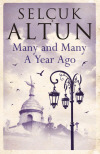Many and Many A Year Ago
Selcuk Altun’s novel is a page-turning adventure story, and miraculously one filled with mystery, despite the fact that every detail of the story is spoon fed to the reader via monologues. A self-proclaimed narrative of “a wild goose chase,” Many and Many A Year Ago follows retired Turkish Air Force pilot Kemal Kuray through various cross continental detective expeditions. While Kemal often feels as if a joke is being played on him through these sometimes fruitless voyages, the reader discovers early on the not-so-subtle meaning behind these quests. Through musical symbolism, Altun writes about the beautiful tragedy of endless love.
Selcuk Altun’s novel is a page-turning adventure story, and miraculously one filled with mystery, despite the fact that every detail of the story is spoon fed to the reader via monologues. A self-proclaimed narrative of “a wild goose chase,” Many and Many A Year Ago follows retired Turkish Air Force pilot Kemal Kuray through various cross continental detective expeditions. While Kemal often feels as if a joke is being played on him through these sometimes fruitless voyages, the reader discovers early on the not-so-subtle meaning behind these quests. Through musical symbolism, Altun writes about the beautiful tragedy of endless love.
Every chapter unfolds another tale of a tragic love lost. We learn very early on of Kemal’s first true love: classical music: “I met the meaning of my life – baroque music… what I really wanted was to be a musician.” In the next chapter, following the tragic theme of unfulfilled passions, Kemal suffers a devastating plane crash and both his concentration and right hand are damaged, and he can never become the musician he always dreamed of. Although he cannot perform, music is still the heart of Kemal’s life, drifting around him in the living city, a part of his soul, and in every description: “I felt my soul glide from my body cell by cell as his Affetuoso soared into the room.” We, too, can feel the oxymoron of the overwhelming peace that affects Kemal as classical music fills his ears.
Kemal sees music everywhere, and Altun uses this musical symbolism beautifully, seamlessly. He describes traffic on the coast road as “symphonic.” At a doctor’s office with his friend, Kemal says Ali “patted his head and took his pulse like a virtuoso tuning his instrument.” A rising mist on the road becomes a “Byzantine choir rising to a crescendo in the hush after the afternoon ezan.” You can hear the music as you read, creeping up on you, tickling the back of your neck. It’s the first book I’ve ever read that feels incomplete without a soundtrack. The musical overtones are what give life to the tragic and often lonely mood of the novel. Kemal himself says, “Music shops breathed life into semi-deserted arcades.”
The sense of life and loneliness often personifies the buildings and streets of the antique cities. From the beginning, in Kemal’s poor hometown, Altun gives breath to his surroundings. The buildings are “god-fearing” and “soulless,” often “grew angry” with Kemal. The “weary” streets and “exhausted” buildings reflect Kemal’s own attitude as he wallows in his tragedies. Despite what seems like inevitable gloom, however, Altun is able to maintain a mysterious air of hope and adventure through the focus on undying love.
Every chapter is the romantic story of yet another character chronicling through fascinating and descriptive monologue how he lost the woman he loved through death, marriage, misfortune, misunderstanding. Love becomes almost synonymous with tragedy. The tragedies drive the book forward as we wait for Kemal to come to the realization that this sort of love is what life is about, this never-ending search for a love that never dies. One character tells him to “go out and look for love even if you know it’s going to end in disaster.” After all these tragedies, and despite the warning that “not every story you play a part in is going to have a prosaic ending,” we hope for a happy ending for Kemal, a love fulfilled.
Despite the melancholia ever present in Altun’s novel, Kemal’s story is a life worth reliving. Any writer, poet, romantic will envy the idleness that allows Kemal to live. To learn about others and himself through watching the people, listening to the tragic love stories, and becoming a part of the living cities. Altun’s novel is as alive as the classical music that flows through it and the love that never dies on its pages.





